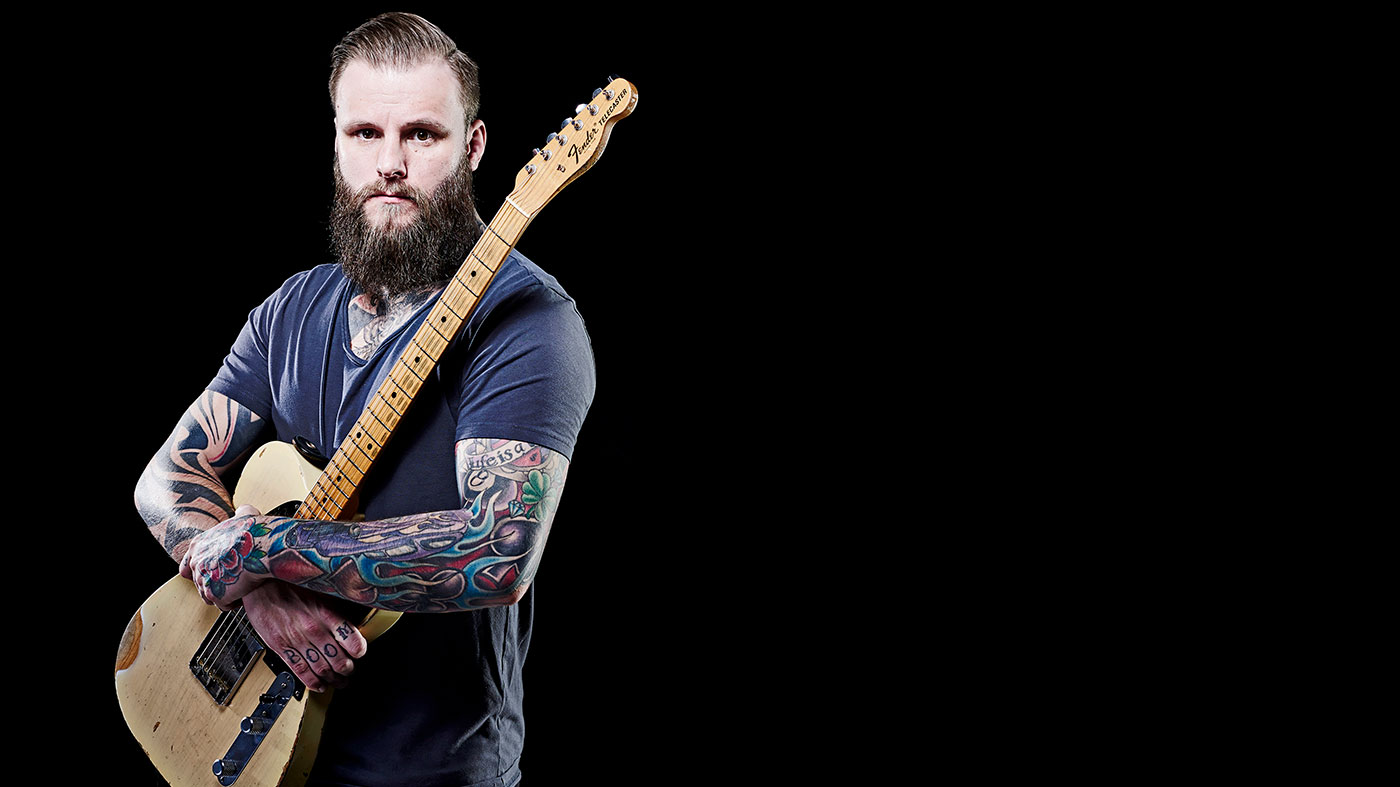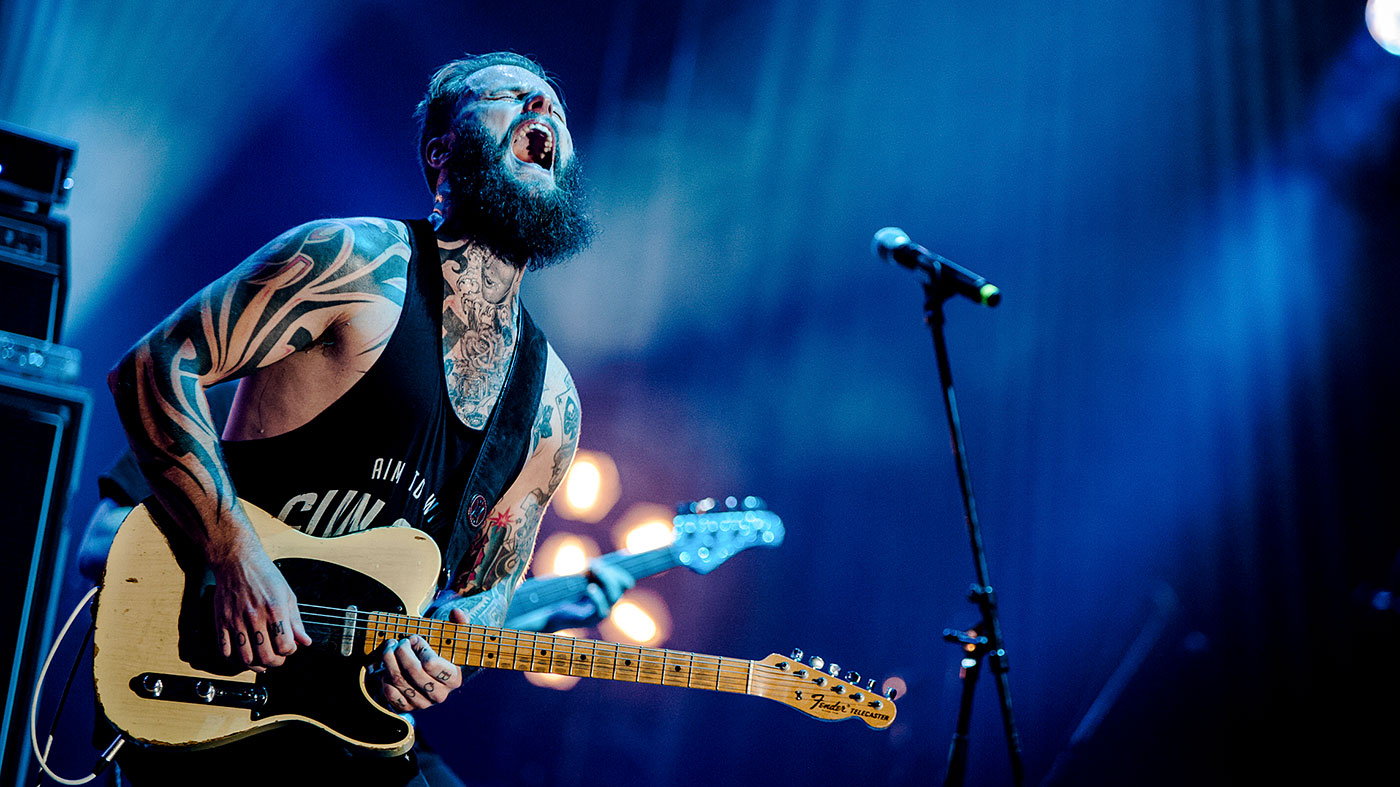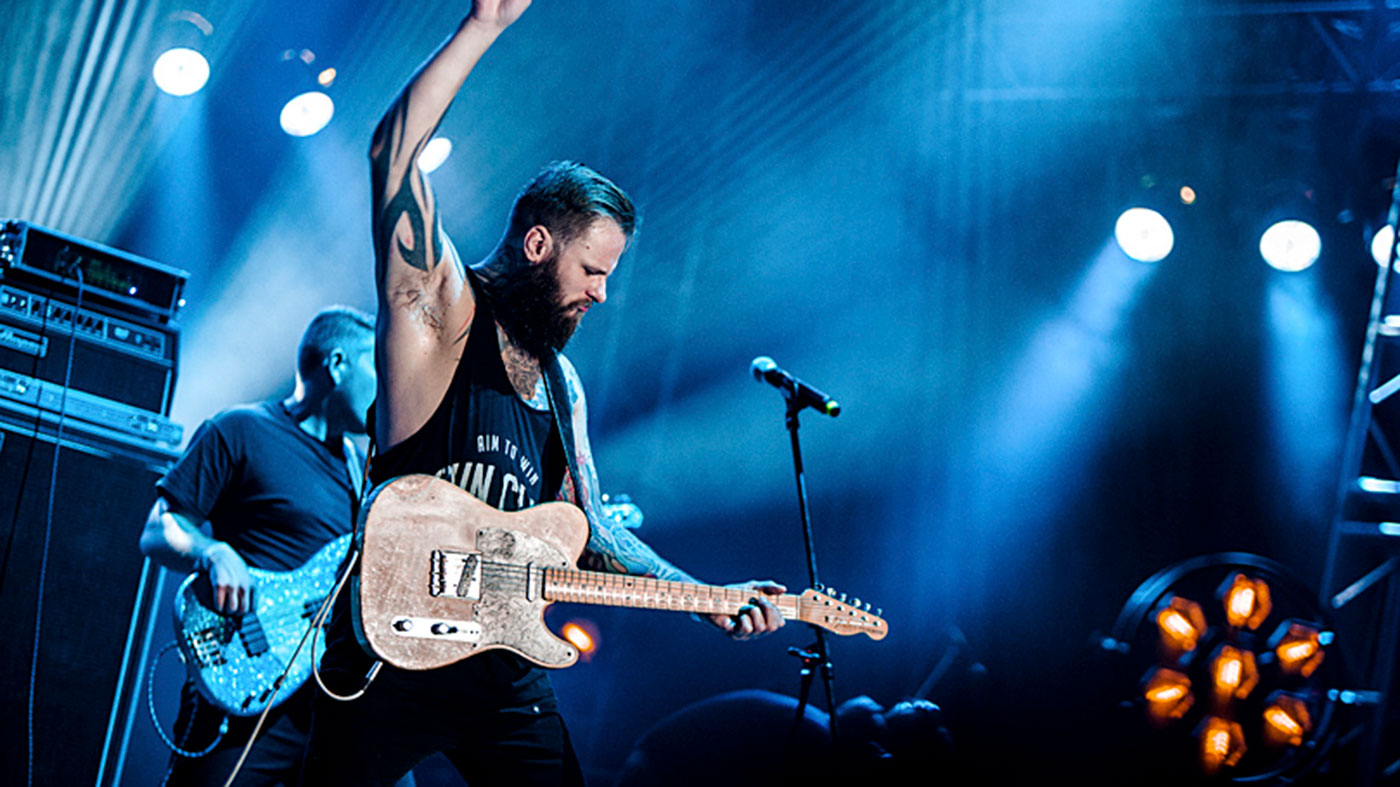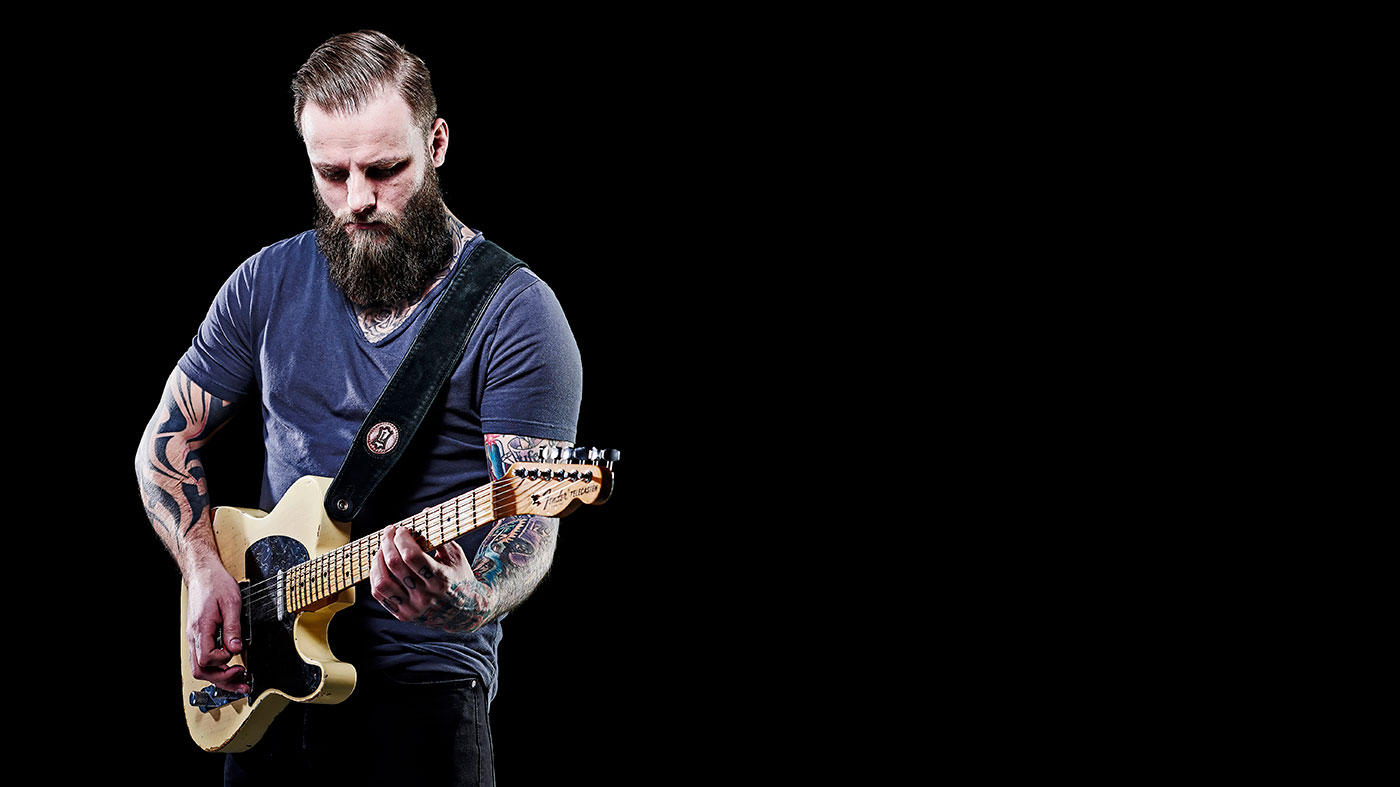Kris Barras: “I think I was always looking for more with guitar and I wanted something that really taxed me”
The UK bluesman on Dirty And Divine and joining Supersonic Blues Machine

Music and martial arts have always had equal billing in Kris Barras’s life, from as early as he can recall.
He started playing guitar at the age of five, around the same time he began studying karate. His early memories of live music consist of watching his guitar and bass playing father performing in pubs at weekends and it was from this that his early musical influences were drawn.
“My dad’s favourite guitarist was always Gary Moore,” Kris tells us, “and so he quickly became my first guitar hero. I just listened to whatever was in my dad’s collection and through Gary Moore’s collaborations with guys like BB King and Albert Collins I discovered the blues.”
Through Gary Moore’s collaborations with guys like BB King and Albert Collins I discovered the blues
His musical development continued in tandem with his interest in professional fighting, the two pursuits combining and colliding over the ensuing years. After retiring from the fighting circuit a few years ago the emphasis was put firmly back onto music, with his recent album The Divine And Dirty receiving acclaim from critics and fans alike.
Just recently Kris’s career took another quantum leap when he was asked to front The Supersonic Blues Machine’s forthcoming European tour with no less than Billy Gibbons guesting with the band. “Supersonic Blues Machine have been one of my favourite bands for the past couple of years,” enthuses Kris. “They’re always on in our tour van - both their albums - and I really love what they do.” It seems that he’ll be in the company of other guitar megastars, too, as more guests for the tour are being announced shortly.
Meanwhile, we thought it was best to track the rise of Kris’s musical career from the very start. After being drawn to music by his father, we were curious to know how things developed…
“I started off on just a little three-quarter size classical Argos special on the proviso that if I put the effort in and showed that I really wanted to do it then my parents would get me an electric guitar,” Kris recalls of his route into playing seriously. “I got my first electric on my seventh birthday, it was a S-type copy made by Encore. That served me well for a couple of years but then I got a 27-fret Hohner Revelation - a real weird bit of kit, but it was cool, I liked it.”
Want all the hottest music and gear news, reviews, deals, features and more, direct to your inbox? Sign up here.

Clubbing
How old were you when you started playing gigs?
“I started getting out on the local pub circuit when I was about 15, 16. When I was 18 a manager guy took us on and took us to the States twice, recorded an album - kind of poppy rock - and then it all fell a bit flat, didn’t really go anywhere. I started getting more into the shreddy stuff, did some stuff for Lick Library and did a DVD for Chops From Hell, which was a really big shred company back in the day.”
What other influences started creeping into your playing?
When I stopped fighting I needed that other outlet to keep me occupied and I just started writing some songs
“In my late teens I started getting more into jazzy stuff, lots of the fusion guys like Pat Metheny, and getting into more heavy duty players like Greg Howe, Tony Macalpine or Frank Gambale, those kind of people. I think I was always looking for more with guitar and I wanted something that really taxed me. That phase lasted a few years and obviously I was doing the fighting thing for years and I was just keeping cover bands alongside it, just doing weddings and stuff and that paid for me to train full-time. So I was doing rock and blues covers at the weekend and I would train full-time during the week.”
So where does the fighting career fit in with all of this?
“In my teens I started a bit of kickboxing, things like that. I had a few years off when I was really hammering the music side of things and then I was getting a bit disenchanted with everything. So I started training again when I was about 18 and I loved it. I had a complete lifestyle change, started eating more healthily, stopped drinking and, before I knew it, started competing and it just kind of rolled on from there.
“When I decided to retire from fighting in 2014 I felt that I’d achieved everything I wanted to achieve and felt that I’d sacrificed enough of my life because as enjoyable as some of it is, the dieting, the dedication and the training takes over your life. I finished in Thailand, I was fighting out there and I said to my other half, ‘That’s it; I feel like I’ve done it’.
“When I stopped fighting I needed that other outlet to keep me occupied and I just started writing some songs. I didn’t really put much thought into what I was going to do, I didn’t set out saying, ‘I’m going to write a blues album…’ It just so happened that a lot of the blues influence that I had from an early age was coming out in the songs. Whilst I wouldn’t particularly say I was strictly a blues guitarist, the blues influence is strong throughout the tunes.”

Divine And Dirty
How did you come to make The Divine And Dirty?
“My first proper album was Lucky 13 in 2016. That one got us a lot more recognition and did well on the Amazon blues charts, that kind of stuff. It got us to bigger festivals, a lot more fans and more notice. Then I started writing The Divine And Dirty. Lucky 13 got us into conversations with different labels and stuff, but it’s a tough industry - you can talk to someone but it doesn’t necessarily mean anything’s going to happen.
“With this album I wanted to work with a producer, wanted to go into a studio and be told what to do, essentially and not have to worry about the production side of things, just go in and worry about playing. The other albums were self-produced and you’re constantly thinking about the production side or engineering when you should be concentrating on the playing. I wanted someone I could trust who would go, ‘No, that’s crap… Try this’. We went in and recorded four tracks and that was never intended to be released like that; I didn’t want to do an EP - I’d done an album before, I didn’t want to just chuck out four tracks.
I don’t get too geeked up on stuff - if I like something, I like it and I don’t get too anal about the details
“I met with Mascot at Ramblin’ Man Fair in the summer and had a conversation over a beer in the bar and got on really well. Then a message came through from the form on my website from Ed, the big boss at Mascot, and it said, ‘Hi Kris, I came across your stuff online, it sounds great. Are you signed?’ I thought, ‘This is someone winding me up, just having a laugh’ but we phoned up and, sure enough, it was legit and three days later we had the offer on the table. After that it was all signed, done and dusted.”
You’ve used Telecasters for quite a while…
“I borrowed one from someone who bought it from a pawn shop in America for 80 bucks or something, it’s a Japanese Squier. That was what I was playing a lot of the time while I was writing my first batch of tunes. I decided I loved it and I loved the Telecaster; I’d always played a Strat before that, I’ve got a 1984 Strat that I’ve had since I was 15 and I was gigging it for a while but I decided I should get my own Tele. The one I’ve got now came up on eBay and I got a good price. It’s a ’68 humbucker model from the Custom Shop… I don’t get too geeked up on stuff - if I like something, I like it and I don’t get too anal about the details. I liked the sound, I liked the way it played, loved the Bare Knuckle pickups…”
What are you currently using for your amplification?
“I’ve got a Laney Lionheart 50w Head - Class A, all valve - and at the moment I use a 2x12 cab. It’s a great amp, really clean and sparkly. But it’s got two channels and the second channel has got the grit I need for the heavier stuff and I use the amp exclusively for all the rhythm sounds.
“On the solo channel I use a Wampler Paisley Deluxe, but other than that it’s straight from the amp. Other pedals I use are compression, an MXR Micro Amp Boost, a POG octave pedal that I use on one song and I’ve got the Wampler Tape Echo, which I use just on my solos. I’ve just started using a Carl Martin Octaswitch, which has made life a bit easier. For years I only used one channel on the amp and did it all from the volume on the guitar, but I’m singing, I’ve got guitar changes and stuff like that - it’s too much to think about, the Octa-Switch does everything for me.”

Going Supersonic
You’ve just come back from another bout of touring. How has the release of the new album affected audience numbers?
Fabrizio [Grossi] saw the videos that my agent put across he really liked what I did
“It was much better than we were expecting. We did two tours back-to-back: there was our headline tour where over half the shows sold out and the other shows were not far behind, which was great for us. Then we moved on to the Beth Hart tour, which was an acoustic support slot in much bigger venues, so we were playing to 1,000 to 2,000 people a night and we were really surprised at the response to that. We didn’t know how well it was going to go down or sell us in the best possible light because it’s not what we normally do, but we did really well.”
How did the gig with The Supersonic Blues Machine come about?
“It was a bit of a weird one. I was put forward as a support act for their London date at the Shepherd’s Bush Empire and unbeknownst to us at the time they were looking for a new frontman. I think they had it whittled down to one of two guys - I don’t know who they were - and when Fabrizio [Grossi] saw the videos that my agent put across he really liked what I did. So my agent asked if I could be considered for frontman and I got chosen for the job.”
You must be incredibly chuffed!
“It’s funny, when I got signed to Mascot I set myself a goal, I said, ‘Within the next two to three years I want to be asked to do a guest solo on a Supersonic Blues Machine track!’ Because obviously that’s what they do, they grab loads of different guys. To think that within six months I’m their brand new frontman, it’s crazy!”
The Divine And Dirty is out now on Mascot/Provogue.


